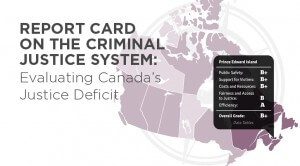 Low crime rates, well-respected police and efficiency in its criminal justice system helped rank tops in Canada’s report card on the provincial and territorial justice systems, write Benjamin Perrin and Richard Audas in the Charlottetown Guardian.
Low crime rates, well-respected police and efficiency in its criminal justice system helped rank tops in Canada’s report card on the provincial and territorial justice systems, write Benjamin Perrin and Richard Audas in the Charlottetown Guardian.
By Benjamin Perrin and Richard Audas, Sept. 22, 2016
Canada suffering from large, growing gap between aspirations of justice system and its actual performance
Canada is suffering from a justice deficit – a large and growing gap between the aspirations of the justice system and its actual performance. It is frequently slow, inefficient and costly. But the rest of the country has something to learn from the Atlantic Provinces, which are bucking these trends with top-ranked criminal justice systems, led by Prince Edward Island.
Our inaugural justice system report card published by the Macdonald-Laurier Institute aims to enhance accountability and transparency, with a view towards ongoing reform and improvement. Using Statistics Canada data and statistical methods (including adjusting for population), we assessed each province and territory’s criminal justice system based on five key objectives: public safety, support for victims, cost and resources, fairness and access to justice, and efficiency.
While the Atlantic provinces and Quebec did well (receiving grades of B+ and B), Ontario and the Western provinces did poorly (C+) with Manitoba ranking dead last among the provinces (C). Driving P.E.I.’s strong performance are its low crime rates, well-respected police and efficiency of its criminal justice system.
P.E.I. has among the lowest crime rates in the country and good clearance rates for violent crimes – an approximation of how well police do at solving criminal incidents. The police are well regarded by Islanders, receiving excellent reviews for ensuring safety, supplying information, being approachable, being fair and responding promptly.
Victims are more likely to have their offenders given restitution orders by P.E.I. judges (5.8 per cent of cases on average) than elsewhere in the country, something that the new Canadian Victims Bill of Rights now requires to be considered. Some provinces order restitution in less than 1 per cent of cases.
Efficiency is another area where P.E.I.’s criminal justice system excels. Only 22.1 per cent of charges on average are stayed or withdrawn (compared with 43.1 per cent in Ontario). The province also has the lowest criminal case length in Canada at 63.2 days – other provinces are having criminal charges thrown out by the Supreme Court of Canada for unreasonable delays. There are also relatively few people on remand awaiting trial in P.E.I., which can mean greater efficiency in processing cases and reduced costs.
It’s not all good news, though, as P.E.I. has some important areas for improvement. Despite taking some measures in recent years to support victims of crime, P.E.I. has one of the lowest rates of victim services referrals per 1,000 crimes of anywhere in Canada. P.E.I.’s clearance rate for non-violent crimes lags behind other jurisdictions, meaning less serious crimes could use some more attention by police. The daily average inmate cost is high and P.E.I. spends far less on legal aid per crime than almost any province or territory.
Our healthcare and education systems have benefited from regular report cards on their performance, although they were faced with strong resistance at first. It is our hope that this inaugural criminal justice system report card will generate tough questions for the many actors responsible for administering the justice system in all provinces and territories, enhance the collection of key data on its performance and spur much needed reform.
We hope this report card will be improved in future years through more frequent and better data collection, and improvements to it based on constructive criticism to make it a valuable tool for Canadians. This inaugural justice system report card can also help other provinces learn from well-performing Atlantic provinces about what is working well, which will at the same time devote attention to problematic areas.
– Benjamin Perrin is a law professor at the University of British Columbia and a Munk senior fellow at the Macdonald-Laurier Institute. He co-authored the “Report Card on the Criminal Justice System: Evaluating Canada’s Justice Deficit”, published by the Macdonald-Laurier Institute, with Dr. Richard Audas, a health statistics and economics professor at Memorial University.




